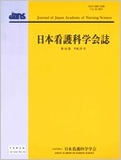Japanese
English
- 販売していません
- Abstract 文献概要
- 参考文献 Reference
要旨
目的:中堅看護師における役割に対する「やりがい感」と「負担感」の同時認知というアンビバレント状況と精神的健康や仕事意欲との関連を明らかにする.
方法:経験年数3年目以上の役職をもたない中堅看護師325名に対して,自記式質問紙調査を行った.質問紙は「基本属性」,「役割ストレス認知測定尺度」,「看護師の仕事意欲測定尺度」,そして「Kessler Psychological Distress Scale(K6)日本語版;以下K6」で構成した.分析は,χ2検定,Kruskal Wallis検定,一元配置分散分析,重回帰分析を実施した.
結果:アンビバレント状況にある中堅看護師のうち,73.4%はK6得点が5点以上で精神的健康が不良であり,また仕事意欲得点は「やりがい感」の低い群より高かった.さらに,それらの看護師において,K6得点は『職場の人的環境作り』と,仕事意欲得点は『自己啓発・積極的看護実践への取り組み』と関連があった.
結論:アンビバレント状況にある中堅看護師は仕事意欲が高くても精神的健康が不良であり,精神的健康は『職場の人的環境作り』と,仕事意欲は『自己啓発・積極的看護実践への取り組み』と関連があることが示唆された.
Purpose: The purpose of this study was to clarify the relationship between the ambivalent state of simultaneous cognition of “worthwhileness” and “burden” and mental health or work motivation among senior clinical nurses.
Method: Self-administered questionnaires were completed by 325 non-managerial senior clinical nurses with three or more years of clinical experience. The questionnaire consisted of personal background information, the role stress perception scale, work motivation measurement scale for nurses, and the Japanese version of the Kessler Psychological Distress Scale (K6). Data analyses were conducted using chi-square test, Kruskal-Wallis test, one-way analysis of variance and multiple regression analysis.
Results: Among senior clinical nurses in a state of cognitive ambivalence, 73.4% scored ≧5 on the K6 that means mental health is poor, and work motivation was significantly higher compared to those having a low “worthwhileness” score. In addition, their K6 scores were associated with score of “making the workplace more humane,” and work motivation scores were associated with score of “self-development and working positively for nursing practice.”
Conclusion: Results in this study indicate that, although work motivation is high, mental health is poor among senior clinical nurses who are in a state of cognitive ambivalence. Also, mental health was associated with “making the workplace more humane,” and work motivation was associated with “self-development and working positively for nursing practice.”
Copyright © 2015, Japan Academy of Nursing Science. All rights reserved.


